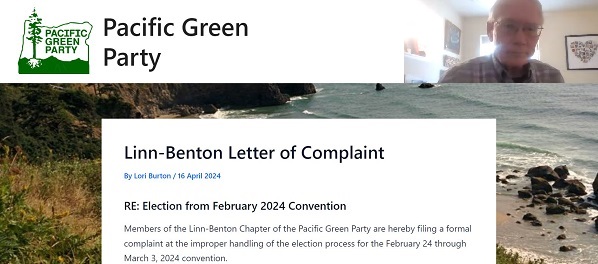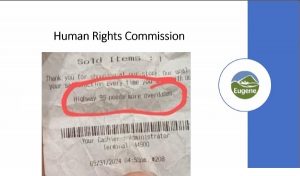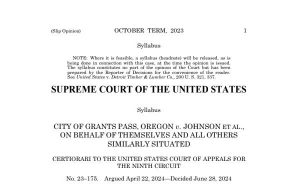After election dispute, 2 Oregon Green Party factions hold separate conventions
7 min read
A split in Oregon’s Pacific Green Party after an internal election in February, where 39 of 75 votes were discarded, changing the election results. Two opposing factions are now asking the secretary of state to recognize their candidates as duly elected.
KEPW News previously interviewed Dan Pulju, so we offered equal time to two other points of view. Nathalie Paravicini is a party officer in the faction currently recognized by the secretary of state. We also spoke with a longtime Linn-Benton member, whose vote was discarded along with the votes of his entire chapter, Mike Beilstein:
Mike Beilstein (Linn-Benton chapter, Pacific Green Party): I don’t like what the (State) Coordinating Committee did with the February convention, the election there. I thought that was very dishonest and harmful to the party. It’s my opinion that it was very dishonest, it was unethical, it was a bad thing to do. But at the same time, I’m really opposed to splitting the party like this. I think it could be resolved quickly, and any outside examination would discover, you know, that the ones who are now the radicals—who are the separatists—are in the right.
[00:01:15] However, we’ve seen the letter from the secretary of state and she’s saying, ‘Well, you know, we don’t know what’s going on. It’s the party’s business and we have people who are listed as the party officials. And so we’re going to go with them.’
[00:01:28] We might be able to prevent this from happening in the future, but I think it’s like, the party has been harmed. We just have to accept that and move on.
[00:01:37] John Q: Both groups claiming victory in the February election organized their own nominating conventions to put forward candidates for the ballot in November. Mike Beilstein wants to run in House District 16, so he attended both conventions.
[00:01:51] Mike Beilstein: I attended both conventions and was nominated at both, not knowing which party ultimately would prevail if the secretary of state has to make a decision about what nominations she’s going to accept. I don’t really want to antagonize anyone. I, you know, I just wish we could all get along, but I can certainly understand the anger that is being expressed through people like Dan Pulju.
[00:02:18] Nathalie Paravicini (Green Party official recognized by the secretary of state, speaking as an individual): This is absolutely not new. This has been going when I got involved again in the Green Party in 2017-18. Mike was one of the first persons I met at a convention in Eugene where there was already a lot of contention, and there was like, ‘Do we have absentee ballot, or no, we don’t have absentee ballot, or maybe we should, or maybe we shouldn’t. But it’s only supporting members. Well, what’s a supporting member? Oh, we don’t know what’s a supporting member.’
[00:02:44] So there’s been a lot of issues with the current bylaws, even, you know, when I got involved, and there was very little that had been defined or worked out when I got involved, right?
[00:02:56] So that’s when I was recruited to come on the steering committee. And what the steering committee did for this past convention is exactly what the people who were in charge of the convention in January and March of 2023 did, they did a strict interpretation of the bylaws that had a net effect of disenfranchising pretty much everybody in the party.
[00:03:22] Mike Beilstein: I’ve been in the party for 25 years. I’ve gone to state conventions. Our branch, which is the only branch or chapter which has existed continually, has never been asked to present a list of supporting members prior to a convention, to establish who would vote. And now we had this convention in February, where after voting, our ballots were eliminated because we had not presented a list of supporting members when almost all of them—those people were supporting members.
[00:03:52] Nathalie Paravicini: I understand. I understand. And I agree with you. I agree with you. I agree with you. I agree with you. (Okay, well) I agree with you. So I agree with you and—but I’m very open about it.
[00:04:05] Mike Beilstein: But you were, you were on the (State) Coordinating Committee and you allowed this to happen without protest.
[00:04:10] Nathalie Paravicini: I did, not necessarily without protest, but we’ve allowed it to happen… I’m moving forward and I’m actually glad that now Linn-Benton has been affected because in the past you didn’t realize that you were affected. And the problem in the party is not about the bylaws. The problem in the party is that some people—and it’s not between one camp and another—it’s about individual people. Because I am currently dealing with people who behave in a very toxic manner, in a very abusive manner.
[00:04:41] They’re calling each other names. They’re short on the emails. They treat each other like rags. They just obstruct, obstruct, you know, say ‘No.’ They delay the meetings. We had to have eight hours of an agenda-setting meeting for September, and then the agenda was not adhered to, is exactly what’s been going on.
[00:05:03] It’s mistreatment, not respecting the other person’s integrity. Like, if, I’m being constantly called names and abused and toxic behavior and doxxing: They called you hysterical. They called you a liar. They called you unhinged. On and on and constantly called you names, right? So that’s been happening to a lot of women. And again, the problem is how the way people treat each other, and allowing that to happen when this has been brought up, because it has been brought up at a whole convention. You remember that, don’t you, Mike?
[00:05:41] Mike Beilstein: I wasn’t aware of it at all. Or if I knew anything about it, I saw it as interpersonal bickering, not something I wanted to get involved in.
[00:05:50] Nathalie Paravicini: Well, that’s exactly the problem, Mike, that when you allow abusive behavior and toxic behavior, especially with people, women who are in leadership position, and you don’t say anything and you allow it to happen, you are allowing people—like four women have resigned from the steering committee, and that was brought up at the January 21 convention
[00:06:11] But if that behavior still continues, because men need to stand up and to say, ‘Listen, that was not an appropriate behavior in a public meeting or in a public forum.’ You’ve got to stand up. Like, if I’m calling you and I contact you and I say, ‘Mike, this group prevented people from voting at the convention. This was just not acceptable.’ You don’t say, ‘Oh, that’s interpersonal bickering.’
[00:06:37] Because now it’s on your doors. Now we use the same strict interpretation of the bylaws. And I agree. I totally agree that it was not correct, right? But we could not allow also people who are on the steering committee who behave in that part and who just use party assets and who turn people away.
[00:06:56] Because I have a list of about six people who are really good organizers who are not going to get involved as long as one or two persons who are on the steering committee are very active because of the toxic behavior. And this is the problem that I’ve been raising and for, you know, four or five years. We cannot tolerate abusive and toxic behavior. You have to force people to sit down and talk to each other in a respectful manner.
[00:07:24] I am not happy with the way the last convention went, and I’m very open about it. I didn’t like the way that they applied, that bylaws were applied. But there was precedent for it, right? Like that precedent had been already made in January and March of 2023. And again, it’s really about how to run conventions.
[00:07:45] So if we can all agree, ‘Hey, let’s run conventions in a way where there’s no toxicity, no verbal abuse,’ everybody can be heard, and everybody’s listened to with respect. We have broad participation and we encourage broad participation. We’re going to review the bylaws at the end of the year, and a lot of work has already been done with that, then there is no reason to split the party.
[00:08:08] And I am really saddened that things are like that, but in a sense now that Linn-Benton is being directly affected by this, it really forces the issue that everybody needs to stand up when there is toxic environment and toxic behavior.
[00:08:23] John Q: Green Party officer Nathalie Paravicini justifies her support of what her opponents call “a stolen election.” Members of the Linn-Benton chapter said she made similar remarks in a visit to their meeting, identifying Dan Pulju and Lori Burton as the two candidates whose election had to be stopped.
[00:08:40] Nathalie Paravicini: I totally agree that it was not correct, right? But we could not allow also people who are on the steering committee who behave in that part and who just use party assets and who turn people away…
[00:08:53] John Q: The secretary of state is being asked to conduct a full investigation. Nathalie Paravicini says the election followed recent precedent, but Mike Beilstein thinks an outside review would restore his chapter’s votes and recognize the election of Nathalie’s opponents, Dan Pulju and Lori Burton.
UPDATE (June 11, 2024): Nathalie Paravicini emphasizes that her statements represent her personal views as an individual.






